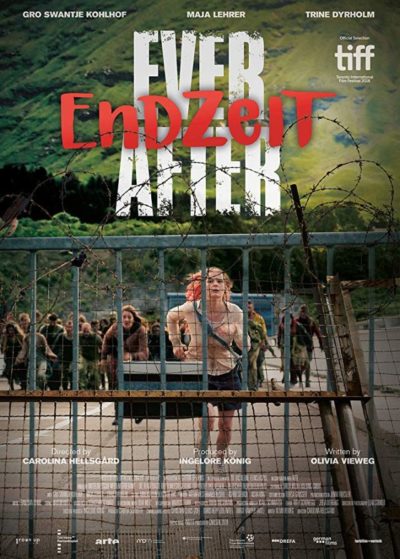★★½
“Off-centre, not dead centre”
 This is not your normal action heroine film. Nor is it your normal zombie apocalypse film. While it certainly nods in both directions, it seems entirely committed to going in its own direction. My mental jury is still out on whether or not this was a good thing or not. I think if I’d perhaps been prewarned what to expect, I might have been better equipped to handle this. It takes place after the outbreak of a plague, with the dwindling number of survivors now holed up in two cities: Weimar, where infection is an immediate death sentence, and Jena, reported to be trying to research a cure.
This is not your normal action heroine film. Nor is it your normal zombie apocalypse film. While it certainly nods in both directions, it seems entirely committed to going in its own direction. My mental jury is still out on whether or not this was a good thing or not. I think if I’d perhaps been prewarned what to expect, I might have been better equipped to handle this. It takes place after the outbreak of a plague, with the dwindling number of survivors now holed up in two cities: Weimar, where infection is an immediate death sentence, and Jena, reported to be trying to research a cure.
The mentally fragile Vivi (Kohlhof) tries to do her part by volunteering on the fences surrounding Weimar, but a brutal incident on her first day sends her into a state of shock. She tries to head for Jena on the automated train which runs between there and Weimar. On it, she meets Eva (Lehrer), who is considerably more versed in the ways of survival. When the train breaks down, the two young women have to set off on foot across country. Which is where things get increasingly odd, as they bump into characters such as the Gardener (Dyrholm), who is running a market garden in the middle of the apocalypse. The zombies themselves also begin to mutate, such as the one on a wedding dress, whose face is half plant. Is nature healing? Or is a human apocalypse not necessarily such a bad thing from the perspective of the rest of Earth’s species?
There is a fair amount going on here to unpack, and it feels like the kind of party to which you have to bring your own booze. For the film offers no easy answers; indeed, I’m not necessarily certain what are the questions it is asking. At times it felt like there was a religious aspect with the Gardener being the snake in Eden. Yet at others, it is more about the different ways Vivi and Eva come to terms with the traumas they have experienced. Vivi shuts down, emotionally and mentally, while Eva adopts a hard shell, prepared to do whatever is necessary to survive. Also of note: there are almost no male speaking roles, though it’s subtle enough not to matter [The crew are also largely women]
There are still the required moments of threat, heroic sacrifice, etc. familiar from the genre. However, these feel almost perfunctory, as if imposed on the director in some kind of contractual obligation. The film might have been better to avoid the standard beats entirely, as these feel out of line with the rest of the movie. On the other hand, if it had gone full art-house, it’s possible I would not have bothered watching it, and almost certainly wouldn’t be reviewing it here. Still, it’s an approach to the zombie film I’ve definitely not seen before. Even if this wasn’t what I expected – or wanted, to be honest – that has to be worth something.
Dir: Carolina Hellsgård
Star: Gro Swantje Kohlhof, Maja Lehrer, Trine Dyrholm, Barbara Philipp
a.k.a. Endzeit




